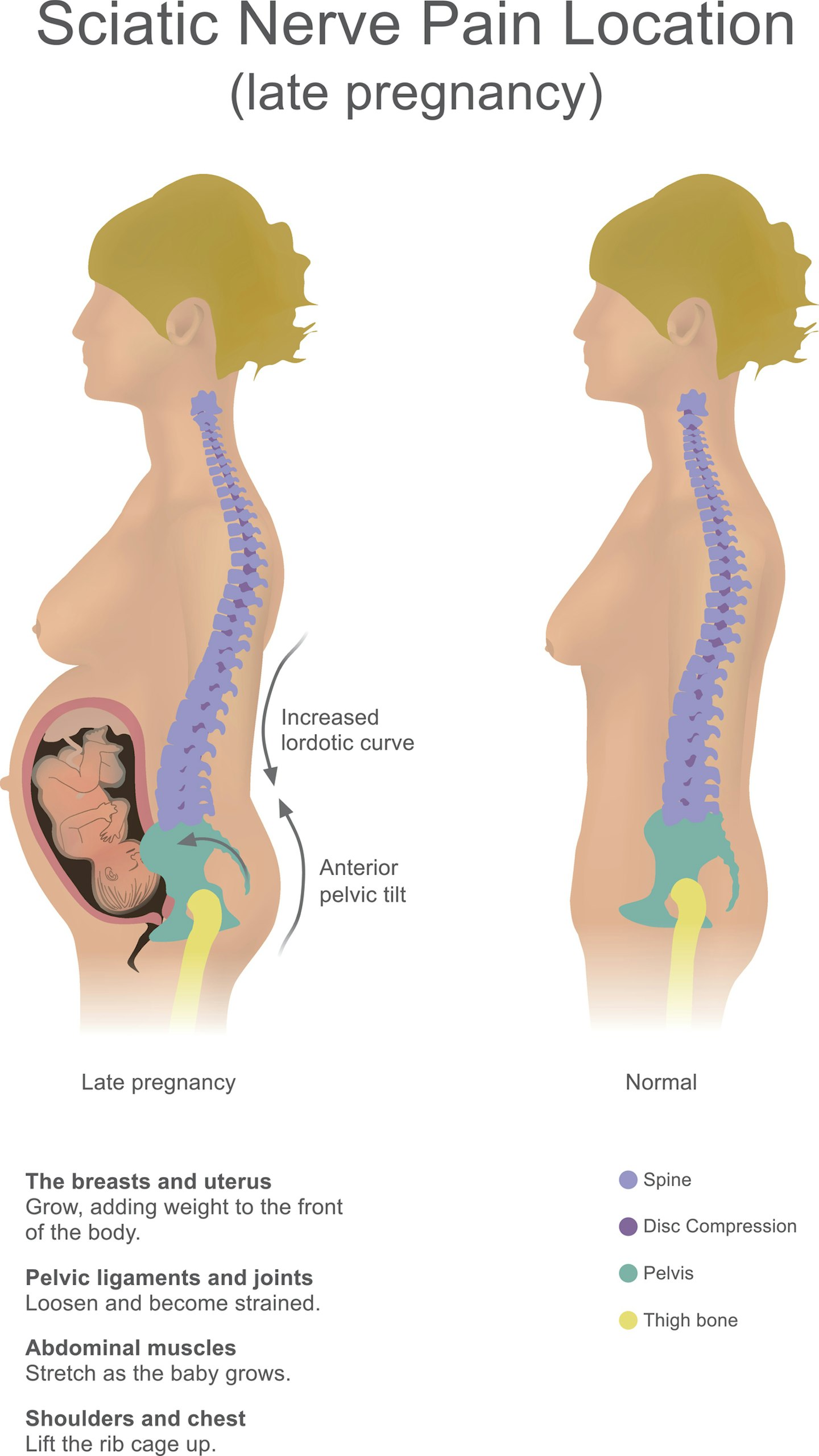Experiencing a sharp, shooting pain from your lower back down through your legs is a common issue during pregnancy, known as sciatica. As your baby grows, the sciatic nerve can become compressed, causing discomfort that can worsen as your pregnancy develops and your body changes. While it can be worrying, the good news is that it's usually temporary and should fade as your body adjusts to postpartum life.
We spoke to Emiliana Hall, a renowned doula and founder of TheMindful Birth Group, for expert insight into sciatic nerve pain during pregnancy. To find out how it happens and offers practical tips for relieving the pain, whether you're experiencing mild discomfort or more intense pain.
What is sciatica in pregnancy?
Sciatica can affect anyone, not just pregnant women. It occurs when pressure is placed on the sciatic nerve, which can be caused by factors such as poor posture, herniated discs, or muscle strain.
However, as previously mentioned, sciatica is common during pregnancy. It’s often described as a sharp, shooting pain that travels from the lower back through the hips and legs. This happens when the growing uterus presses on the sciatic nerve, which runs along the spine and down the legs. As the baby grows, the added pressure can cause pain, numbness, or tingling, making it difficult to move comfortably.
What causes sciatica during pregnancy?
The NHS explains that sciatica pain in pregnancy is often linked to the pressure exerted on the sciatic nerve, the largest nerve in the body. This pressure can be attributed to various factors:
• Weight gain: As the pregnancy progresses, the growing uterus can exert pressure on the sciatic nerve, leading to discomfort.
• Posture changes: Alterations in posture to accommodate the changing body shape can contribute to sciatic nerve compression.
• Hormonal changes: Pregnancy hormones, such as relaxin, can loosen ligaments, potentially affecting the alignment of the spine and contributing to sciatica.
Baby's position: The position of the baby in the uterus can also play a role in sciatic nerve compression.

How can I relieve Sciatica pain during pregnancy?
If you're experiencing unbearable sciatica pain during pregnancy, gentle stretches, good posture, and seeking support from a healthcare professional can help relieve discomfort and improve mobility. We will now break down the best natural ways to cure sciatica.
Keep moving: As tempting as it may be to stay in bed when you're in pain, gentle exercise can help soothe your muscles and improve your overall well-being. Focus on low-impact activities that aren’t too strenuous on your body. Going for a walk is perfect.
Prenatal yoga: Engaging in prenatal pregnancy yoga under the guidance of certified instructors can promote flexibility and reduce sciatic nerve pressure.
Physiotherapy: Seeking guidance from a physiotherapist can provide tailored exercises to alleviate sciatica symptoms.
Grab a hot water bottle: Applying heat to the affected area can help reduce inflammation and ease pain.
Invest in a pregnancy pillow for support: Properly placed pillows while sitting or sleeping can offer support and relieve pressure on the sciatic nerve. Pregnancy pillows have been specifically designed to ease aches and pains.
Get a massage: Consider gentle massages to relax tense muscles, but ensure a trained professional performs them.
See a pregnancy chiropractor. A pregnancy chiropractor specialises in safe, gentle adjustments to help alleviate pain, improve posture, and support overall comfort during pregnancy.
Symptoms of sciatica pain in pregnancy
To identify pregnancy sciatica, look for sharp, shooting pain that starts in the lower back and radiates down one leg. It is often accompanied by numbness, a tingling sensation, or weakness. The pain may worsen with prolonged sitting, standing, or certain movements like twisting and bending, making daily activities more difficult.
Recognising these symptoms is important to ensure proper management, prevent further discomfort, and rule out other conditions requiring medical attention.
At what stage of pregnancy do you get sciatica?
Sciatica can occur at any stage of pregnancy, but is most common in the second and third trimesters as the baby grows and puts more pressure on the sciatic nerve. As the baby grows, the extra weight gain shifts the body's centre of gravity, leading to changes in posture that can strain the lower back and pelvis. These factors, combined with the pressure from the expanding uterus, make sciatica more likely to develop or worsen in the later stages of pregnancy.
Is Sciatica worse at night?
For some people, sciatica symptoms may worsen at night due to insufficient movement and certain sleeping positions. Implementing supportive pillows and maintaining proper sleeping posture can help alleviate nighttime discomfort.
Finding a comfortable sleeping position is crucial for managing sciatica during pregnancy:
Side sleeping: Sleeping on your side with a pregnancy pillow between your knees can alleviate pressure on the sciatic nerve.
Supportive mattress: Investing in a supportive mattress can provide additional comfort during sleep.
And, if you are wondering what causes Sciatica to flare up during your pregnancy journey, this may flare up due to various triggers:
Poor posture: Maintaining good posture is essential to prevent exacerbating sciatica symptoms.
Lifting heavy objects: Avoid lifting heavy objects, as it can strain the lower back and contribute to sciatic nerve compression.
Stretches for sciatica pain
You can incorporate the following sciatica stretches under the guidance of healthcare professionals/trained therapists:
Pregnancy-safe yoga poses: Prenatal yoga poses that focus on gentle stretching and flexibility can be beneficial.
Pelvic tilts: Performing pelvic tilts can help strengthen the core and alleviate pressure on the sciatic nerve.
Cat-cow stretch: This yoga-inspired stretch can improve spine flexibility and ease sciatica discomfort.
While gentle massages can be beneficial, consulting with a trained professional who can target the muscles around the sciatic nerve without causing harm is crucial. Massaging the lower back and buttocks with proper techniques may provide relief.
FAQs about sciatica
What's the difference between sciatica and pelvic pain?
While sciatica is caused by pressure on the sciatic nerve, leading to pain that radiates from the lower back down the legs, pelvic girdle pain is focused on the joints of the pelvis and typically causes discomfort in the hips, groin, or lower back.
What causes sciatica buttock pain during pregnancy?
Hormonal shifts, particularly the release of relaxin, loosen ligaments, affecting pelvic stability and increasing nerve irritation. This can cause sharp or aching pain in the buttocks, often radiating down the leg. The discomfort can worsen with prolonged sitting, standing, or sudden movements, but gentle exercises, good posture, and stretching can help alleviate the pain.
Meet the expert:
Emiliana Hall is the founder of The Mindful Birth Group®, which provides award-winning Mindful Natal courses and the PregnaHub online platform, as well as an accredited Teacher Training program and Midwife CPD courses. She is also an experienced Birth and Postnatal Doula. Emiliana's vision is to make vital antenatal and postnatal education and ongoing support accessible to everyone in the UK.
About the author
Mummy to a little girl, Adejumoke Ilori is a Commercial Content Writer for Mother&Baby. With a BA hon in Creative Writing, she has worked for digital platforms, where she has empowered women from the inside and out, by sharing real-life stories based on relationships, loving yourself and mummyhood.
